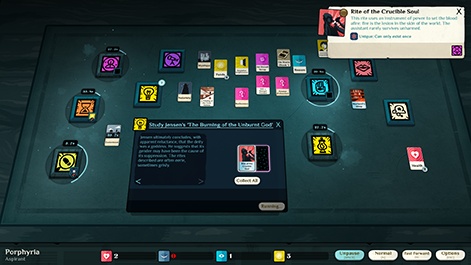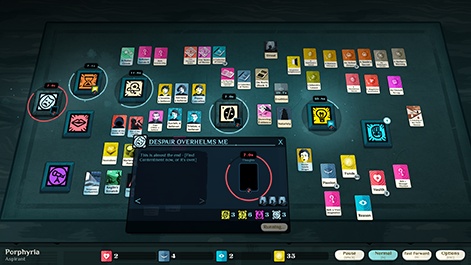A lot of strange games pop up on Steam these days, but a title like Cultist Simulator still draws a fair bit of attention.
Developed by Weather Factory, an outfit formed by Failbetter vets Alexis Kennedy and Lottie Bevan (pictured), the project is a Kickstarter-funded card game that draws upon the mythos of HP Lovecraft.
"'A game of apocalypse and yearning' [was the original lift pitch]," Bevan tells PCGamesInsider.biz.
"We realised this didn't explain much about gameplay, so it shifted over time to variants of 'Lovecraftian horror card game' instead. But the original pitch is still in our marketing blurb! Alexis had a clear idea of the game's vision from the outset, and it stuck."
Already the game is doing pretty well for itself. As reported yesterday, Cultist Simulator has racked up around 40,000 sales in its first two weeks on shelves. This was higher than the 30,000 copies the team expected to shift in the game's first year in the wild.

"[The launch has gone] better than our wildest dreams, with a lacing of mild zing," Bevan says.
"We'd set our expectations low - weird narrative indie games made by a core team of two people aren't going to rock the boat, right - but launched straight to a Steam No.1 top seller and hung about in the top sellers/trending list for nearly a week. It's meant that our deliberately Marmite game has received a few more negative user reviews than we'd expected, as it was featured on the front page of Steam so was picked up by a more diverse crowd of gamers than we'd expected, but that's literally the price of fame. We're absolutely delighted overall."
The game is doing so well in fact that the developer is ramping up its plans for post-launch content.
"We've been committed to releasing some DLC since the Kickstarter back in September 2017, but now the game's done so well commercially, we're likely to release a bunch more," Bevan says.
"This'll be content-based and tend to revolve around new legacies and new starting character roles. We have a number of ideas for improved interactions in-game, too, ranging from better and more varied conversations with your Followers to a 'Rival' mechanic where you can be betrayed if you don't treat your high-level occultists well. We're looking forward to adding to Cultist Simulator for a good while yet."
We've been committed to releasing some DLC since the Kickstarter back in September 2017, but now the game's done so well commercially, we're likely to release a bunch more
Bevan says that the studio had not planned to market the game after its launch, something it would do differently for a future release.
"I'm sure we could have maintained better numbers for longer if we'd had [a post-launch marketing plan] in place," she admits.
"Equally, we didn't design Cultist Simulator for the generalist audience you get when you're visible on Steam's front page, which is partly why it's taken a bit of a beating in user reviews despite being received very well critically. We can improve on this in future by spending more time on UI/UX polish, so even if the game isn't for you, you still feel like it's an overall top-notch experience.
"Finally, the amount of feedback we received in one big cloudburst after launch was quite hard on Alexis, as the sole designer - even though the critical and commercial reception has been overwhelmingly positive, it affects your brain to hear thousands of voices pointing out flaws. We'll be aware of that next time, and ready for it."
As said before, Weather Factory's founders are veterans of Fallen London and Sunless Seas developer Failbetter. As you'd imagine, there are a number of lessons that they took away from working on an outfit of such esteem.
"Open production's the first: I cut my teeth on developing along with the community on Fallen London," Kennedy says.
"Lottie and I have been refining it since. We can no longer imagine developing a game without some form of early community building and ongoing dialogue with fans."
"Additionally, it's surprising how quickly you lose touch with your players when your company's any size larger than a four or five-person team. It wasn't until Alexis left Failbetter that he realised how much the dialogue had turned from humans speaking to humans into developers being spoken for by a communications team. That's not a bad way to do business, of course, but it's not the personable indie approach we'd like to keep at Weather Factory.
"And finally, Fallen London, Sunless Sea and Cultist Simulator have all been decidedly outre games. They're not for everyone, but they've all been big successes. The lesson we've drawn from this is that niche gaming is a great place to be - people like games which do things differently, and you're not having to compete directly with the big hitters if you're doing something a bit off the wall."

Kennedy says that the reason he left Failbetter was to focus on the creative aspects of making games, rather than managerial pressures.
"Weather Factory's microstudio set-up means I'm now very involved with development," he says. "I'm able to take creative risks without worrying about the potential impact on lots of employees, should things not go to plan.
Bevan adds: "I left Failbetter for a number of reasons, one of which was that I didn't have anywhere to grow. Now I've co-founded a studio and am suddenly responsible for not only production but marketing, art and biz, too. It's the best thing in the world."
















